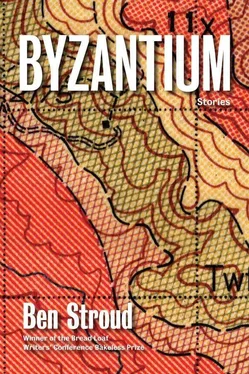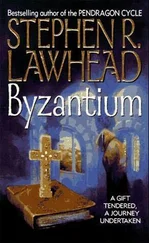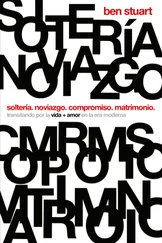Mota looked at the man. He remembered Don Ignacio’s daughters, two egg-shaped creatures stuffed into silk. The last time he had visited, they had sat at the end of the room, large-eyed and silent as they snuck strips of ham from their handkerchiefs into their lapdogs’ mouths. Then the shatter-thump of the stamping mills had resounded through the valley, reached even the alcalde ’s curtained parlor, and Don Ignacio had been trying to distract him — with false protests and complaints — from the assay office accounts.
“The mine is fantasy,” Mota said, and at this Don Ignacio remained silent until, some minutes later, a bell summoned them to a dinner of meatless stew.
Later that evening, past midnight, Mota woke to a rustling. He’d slept lightly, uncomfortable in Don Ignacio’s house. Now, leaning his head up, he saw a figure crouched before his spilled packs: one of the Tepeques, turning papers over in the moonlight. Mota took his dagger from beneath his pillow and crept up to the Indian. Clapping one hand over the man’s mouth, he brought the dagger point to his throat with the other. At the touch of steel, the Tepeque stiffened in his arms. Mota thought about pulling the dagger closer, feeling it slice into flesh, letting the Tepeque’s blood stream over his fingers. He’d awoken clenched by a sorrow, and he hungered for whatever alchemy the Tepeque’s blood might work in his heart. But instead, after holding him a little longer, he dragged the Indian to the door and with a kick set him free. Then he roused the others and within fifteen minutes they were riding out of town on the northern trail.
HIS BRIEF TIME WITH MARÍA ISABEL, Mota had long decided, had simply been an aberration from his life’s regular, solitary course.
While a boy in Seville, he’d often sat in the corner of his father’s study, alone, and watched the other children in his quarter with a cold eye. They sometimes played beneath the study’s window, and after they had left, in pursuit of some other pleasure, Mota would slip into the street to pick up the pig’s bladder they had abandoned — he would blow into it, as they had, and marvel at how it stretched — or hide where the cleverest had hid during their last game. Sometimes the children found him and invited him to play. He would run with them as they made faces at the wandering Capuchin mendicant, stole a cone of sugar from the grocer’s cart, halted with a hush before a bearded, iron-chested soldier on his mount. But always he felt a shadow between himself and those who were briefly his fellows.
The shadow had returned once María Isabel was put in the ground. During the years following Cuencamé, when Mota performed his work, assaying ores and checking ledgers, he shut himself away from others, and as his story was learned the people of the camps treated him with a careful respect, believing him to be in the grip of a melancholy that in time, as his injured heart healed, would be sloughed off. But he remained unchanged, and eventually their respect turned to disdain. They said he was like a spoiled child fed only on sweets, that he let pain rot within him. When Mota overheard this he agreed: he could feel the rot just beneath his skin, viscid and black.
IN DURANGO, cattle filled the streets, lowing and raising a dust that dimmed the sky while vaqueros circled and struck them with tasseled whips, readying them for the drive to the great mining camps at Parral. Two days beyond the town they crossed mud flats and wide salt marshes, then switch-backed up a rocky gap in the Sierra San Andrés. During the uprising, Father Pascual told them, a band of Conchos had set up in the gap and waylaid refugees from the coast. After the Conchos returned to the north, he’d heard, a presidio captain’s daughter, a girl of thirteen, came out of the hills, belly round with child, tongue clipped from her mouth.
Six days later Mota and his men reached the ragged settlement that was Tamotchala, a single street of tents and half-finished adobe houses. In its fly-filled market Indians sat with vegetables and twists of rusted tin on their blankets, gathered from who knew where, while scrawny mules stood roped together, avoiding sale. It was a desperate, dreary place, but Mota, despite himself, felt a muffled fluttering in his gut. He had been to Tamotchala just once before, to inspect the nearby Ojo de Dios mine, a pit worked by a handful of creoles and half bloods living beneath stick shelters. But he’d never been beyond the town. Few had. Above Tamotchala spread the blank parchment of the viceroy’s map.
A SANDY INDIAN TRACK LED NORTH and cut through a forest of dry, tangled trees choked with cactus. Mota and the others picked it up just across the river from Tamotchala and for days followed it without event. They passed two abandoned settlers’ clearings, cabins burned and corrals torn down during the uprising, and after the fourth stream they crossed they came upon patches of tilled bean fields, a village of dried mud, and a square of ash and blackened timber. Indians in the fields and in the mud houses stopped their work and looked.
“These are the Mayos,” Father Pascual whispered in Mota’s ear. “That”—he nodded discreetly at the ashen square—“was one of our missions.”
The Mayos watched as Mota and the others passed through. It seemed to satisfy the Indians that the party wasn’t stopping but continuing on. Over the next days the forest began to thin. Their third day from the village, they rode past bleached bones, and the sixth day out they arrived at the grassy edge of a wide river. Mota saw a mud break in the distant reeds, the track continuing on the river’s other side. But before he could ford the river, Father Pascual stopped him. They had entered Yaqui territory, and this was the water they must follow east.
“First to the village of Bacom,” Father Pascual said, “and from there to Cocorim, and then into the mountains.”
Cottonwoods grew along the river, but soon gave way to another bean field, at the end of which was a village much like that of the Mayos, with mud houses and a few old stilt huts of mat and cane. As they approached the village, Father Pascual hung at the back. Since leaving Mexico, he had grown out his beard, and now he pressed his hat low on his head.
Just as in the Mayo village, they were watched from hut and field, but here an old man in a long cotton shirt waited for them in the middle of the track. He didn’t move as Mota approached, and when Mota halted the old man asked their business in piecemeal Spanish.
“We’re riding into the mountains,” Mota said. He had worried there might be trouble when they reached this part of the journey. It was from here, the country along the river, the Jesuits had taken their slaves. But the soldiers had been cruel when they came north to put down the rebellion, and Mota hoped the memory of that cruelty would be fresh in the Yaquis’ minds, make them wary and timid. He listened to the dull slide of metal against leather, El Sepo drawing his ivory-handled stiletto.
The old Yaqui spat. “Nothing good in the mountains.”
“We go under orders of the king. We have no dealings with the Jesuits.”
“Mountains empty,” the old Yaqui said. “You turn back.” He watched Mota with flinty eyes, but when Mota spurred his horse, the man got out of his way.
Messengers must have sprinted through the bean fields with whispers of their arrival, for in the next village — the one called Cocorim — Yaquis lined the path. No one tried to stop Mota or the others, but one Yaqui danced before them as they rode, contorting to show the curdled skin of his burnt shoulder, the ridged lash marks along his back, his broken, twisted arm. He yelped and turned, and as Mota watched him turn again he saw the vacancy in his rolling eyes, the absence of a reason long since lost.
Читать дальше











